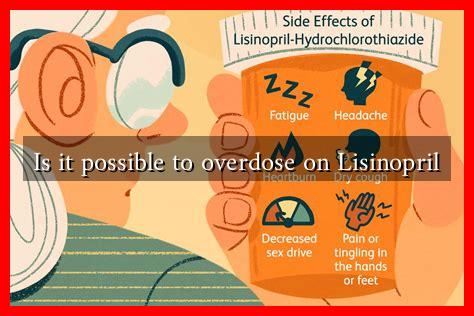-
Table of Contents
Is It Possible to Overdose on Lisinopril?
Lisinopril is a widely prescribed medication primarily used to treat high blood pressure and heart failure. As an angiotensin-converting enzyme (ACE) inhibitor, it works by relaxing blood vessels, making it easier for the heart to pump blood. While Lisinopril is generally safe when taken as directed, concerns about overdose can arise. This article explores the potential for Lisinopril overdose, its symptoms, and what to do in such situations.
Understanding Lisinopril and Its Uses
Lisinopril is commonly prescribed for various cardiovascular conditions, including:
- Hypertension (high blood pressure)
- Heart failure
- Post-myocardial infarction (heart attack)
- Diabetic nephropathy (kidney damage due to diabetes)
As with any medication, it is crucial to adhere to the prescribed dosage to avoid adverse effects. The typical starting dose for adults is 10 mg once daily, which can be adjusted based on individual response and tolerance.
What Constitutes an Overdose?
An overdose occurs when a person takes more than the recommended dose of a medication. For Lisinopril, this could mean taking significantly higher doses than prescribed, either accidentally or intentionally. The threshold for overdose can vary based on individual factors such as age, weight, and overall health.
Symptoms of Lisinopril Overdose
Recognizing the symptoms of a Lisinopril overdose is crucial for timely intervention. Common symptoms may include:
- Severe hypotension (low blood pressure)
- Dizziness or lightheadedness
- Fainting
- Rapid heart rate
- Kidney dysfunction
- Electrolyte imbalances (e.g., high potassium levels)
In severe cases, an overdose can lead to shock, renal failure, or even death. It is essential to seek immediate medical attention if an overdose is suspected.
Case Studies and Statistics
While specific statistics on Lisinopril overdose are limited, a review of the literature indicates that ACE inhibitors, including Lisinopril, are among the medications most frequently involved in overdose cases. A study published in the *Journal of Clinical Hypertension* found that patients with a history of non-compliance with medication regimens were at a higher risk for overdose incidents.
In one notable case, a 65-year-old male patient was admitted to the emergency room after taking 80 mg of Lisinopril instead of his prescribed 20 mg. He presented with severe hypotension and required intravenous fluids and medications to stabilize his blood pressure. This case highlights the importance of medication management and patient education.
What to Do in Case of Overdose
If you suspect an overdose of Lisinopril, it is vital to act quickly:
- Call emergency services or go to the nearest hospital.
- Provide medical personnel with information about the dosage taken and the time of ingestion.
- Do not induce vomiting unless instructed by a healthcare professional.
Medical professionals may administer treatments such as intravenous fluids, medications to raise blood pressure, or dialysis in severe cases.
Preventing Lisinopril Overdose
Preventing an overdose begins with proper medication management. Here are some tips:
- Always follow the prescribed dosage and schedule.
- Use a pill organizer to keep track of doses.
- Communicate with your healthcare provider about any concerns or side effects.
- Keep medications out of reach of children and pets.
Conclusion
While Lisinopril is a safe and effective medication for many individuals, the potential for overdose exists, particularly if the prescribed dosage is not followed. Recognizing the symptoms of an overdose and knowing how to respond can be life-saving. Always consult with healthcare professionals regarding any concerns about medication management. For more information on Lisinopril and its effects, you can visit the Drugs.com Lisinopril page.
In summary, understanding the risks associated with Lisinopril and adhering to prescribed dosages are crucial steps in ensuring safe and effective treatment. Awareness and education can significantly reduce the risk of overdose and its potentially severe consequences.

